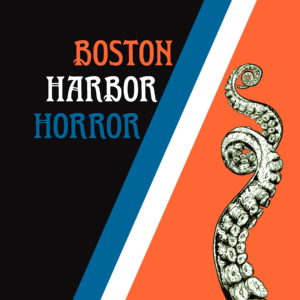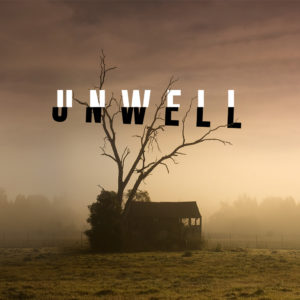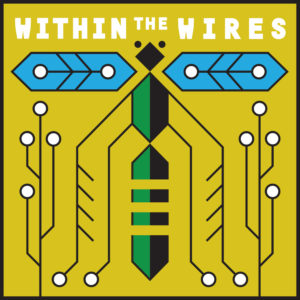A few years ago I wrote about a number of audio drama podcasts I was listening to, as I’d just gotten into the medium as a vehicle for fiction. Today I listen to even more audio dramas than I did then – and I wanted to write about several I’m really enjoying. All of these are currently releasing episodes or will resume doing so soon, so this is a good time to jump in and catch up on any that sound appealing to you.
Badlands Cola
You’ll find that I enjoy a lot of weird mystery stories, and Badlands Cola might be the weirdest mysteriest of all of them (including its name!). Private detective Sunny is hired to go out to the Canadian badlands where cult leader Jasper Moon grew up. Moon was arrested just recently following the deaths of several of his followers. The town is known mainly for its dinosaur fossils, and its large dinosaur replicas around town. Sunny meets local radio host Strathcona (what a name! Apparently named for several places around Canada) who has some connection to Moon and his sister Melinda, as well as the closed paleontology center. Sunny pokes around trying to find out what Moon was up to, but there’s a lot more going on here than meets the eye.
Renee Taylor Klint’s show is built around Liz Morey’s performance as Sunny – who seems increasingly out of her depth as a not-so-hard-boiled but determined detective – and the ubiquitous Briggon Snow as Strathcona – a traumatized yet strong-willed man caught between his past and the present. The show has an atmosphere of bleakness, of Sunny being stuck out there on her own with only this one weird guy who doesn’t even like her to have her back. It’s nearing the end of its first season and looks like it’s building to something big and ominous, and the fact that it’s building to anything at all – as opposed to Sunny just getting the perpetual runaround from the locals – is only revealed a bit at a time.
Boston Harbor Horror
This is flat-out Lovecraftian horror based in and around New England. It focuses mainly on Coast Guard Petty Officer Alex Devereaux, who finds a mysterious artifact and gets caught up in the machinations of a cult. While he finds allies in Professor Matthew Alvarez and Special Agent Kerri Stone, Alex doesn’t quite make it through the first season unscathed – but he does make it through. In season two he investigates a particularly brutal murder, while season three (in progress) has been split between Agent Stone investigating strange events in Antarctica, and a group of sailors trying to rescue a drifting ship in the Atlantic.
Creator Mike Gagne voices Alex – one of three shows here where the creator also voices the lad character. I have very little insight into what goes into making audio dramas, but it’s pretty impressive that all three creators do fine jobs in both roles.
Fans of The White Vault ought to enjoy Boston Harbor Horror, though it’s more overtly horrific than TWV but it has some of that slow-burn feel at times. It steadily improves season-over-season, and I’m looking forward to the rest of this season playing out, although it’s been slowed down a bit because of Gagne’s work situation (internet at his current posting is not great). If cults and ancient artifacts crossed with the realistic (as far as I can tell, anyway!) modern maritime procedures are your jam, then this one is for you.
How I Died
Dr. Jon Spacer is a forensic pathologist with a unique talent: He can see and talk to the dead. This is pretty useful in his job – working for the police department of the town of Springfield – except that his boss, Sheriff Fran Crowley wants him to stick to examining the bodies and not solving cases, and of course no one knows what Jon can do. On top of this, the now-defunct Springfield Corp research lab experienced a weird event back in 1989 whose effects are still being felt – but only Jon perceives them. And on top of that there’s a serial killer.
Creator Vince Dajani voices Jon and does a lot to carry the show, as Jon is often caught between doing the right thing, keeping his secret, and investigating the deeper mysteries of the town. Shaina Waring is an effective counterweight as Crowley, who goes from finding Jon annoying, to suspicious, to… well, any more would be spoilers.
Now in its third season, How I Died reminds me of Babylon 5 in structure, in that each season has a significant change to the status quo (and a new arrangement of the theme music, too!). Overall it works really well as both a mystery and a character drama. I might quibble that sometimes Jon’s actions seem a little too reckless, and sometimes other characters are too conveniently willing to overlook his weird behavior, but it’s easier to just go with the flow of what the show is doing than try to poke holes. It has some things to say about death and being a good person. It can be a very intense show at times, and doesn’t shy away from some gruesome crime scenes, so be aware.
90 Degrees South
Part police procedural, part eccentric character drama, with dashes of weird fantasy mixed in, 90 Degrees South had me looking forward to it every week of its first season. After a scientist is murdered at Amundsen Research Station in Antarctica over the winter, U.S. Deputy Marshal Bass Marlowe is sent to investigate. Under immense political pressure, Marlowe finds allies and friends on the station to balance out the suspicion and wariness he inspires in others. He also finds a smattering of supernatural occurrences which might be relevant – or maybe not.
The show has a surprisingly small cast despite a large number of characters: Marlowe and most of the male roles are played by Trent Shumway, which I had no idea about until I saw the cast list on the show’s web site, because many of them are extremely different from one another. While the few – the two IT geeks and the janitor, for instance – are obviously played as very broad caricatures, others are straight dramatic figures. It’s an impressive set of performances.
90 Degrees South revels in its eccentric characters, even as Marlowe is engaged in a very serious and potentially deadly hunt. But there are also some very touching moments as characters learn or confess things about themselves. And then there are the moments of outright weird, starting with the man who claims to be a demon lawyer.
The first season brings its main story to a close, but also ends on a cliffhanger, and leaves several threads unresolved. I’m hoping that some of the smaller weirdnesses will be explored and/or explained and not just be transitory color. In any event I’m very much looking forward to season two.
Palimpsest
Palimpsest has two characteristics that I’m not usually into: It’s an anthology series – each season is a new story – and it’s a single-narrator fiction series – Hayley Heninger narrates Jamieson Ridenhour’s stories. But in fact it all comes together nicely: Full-season stories get into enough depth to satisfy me, and Heninger gets into each of the main roles convincingly, while adding some color when other characters speak up. The stories are all written as diaries or reminiscences of the main characters, which further sells the approach.
The show’s tag line is “embrace what haunts you”, and “haunt” is the right word: There’s some horror here, but the stories are more creepy and haunting, rich with atmosphere and setting. I think my favorite season is the third, about a woman who worked for the British code breakers during World War II, but all four are excellent. The show is currently running a set of single-episode vignettes between the fourth and fifth seasons.
Spectre
This one reminds me of Becky Chambers’ novel A Long Way to a Small, Angry Planet: Both are found-family stories that take place on starships with small but diverse crews. A key difference is that while the main character in the novel joins the ship voluntarily, in Spectre the lead character of Rho (voiced by creator Stef Howerton) has escaped from a facility and ended up on the ship because it was one she was able to get on. Fortunately, the Spectre is a crew of good people – even if they do take jobs as mercenaries, albeit ones trying to work for the right people.
Rho has also lost her memory and has no idea why she was in the facility, though it turns out she had been augmented with fantastic abilities – which might be great if she could just control them (just what you want when you’re on a tin can in space). Not that the crew of the Spectre doesn’t have secrets of its own, starting with its mysterious captain.
Nearing the end of its first season, Spectre has been focusing mainly on Rho, so the large cast of characters feel a bit thin, as does the backdrop. Hopefully these details will be filled out in future seasons.
Unwell
Lily Harper moves to the small town of Mount Absalom, Ohio to help take care of her mother Dot, who runs a historic boarding house, is recovering from an injury, and has the early stages of dementia. Which all sounds like a bummer of a show, except that Unwell actually has some of the liveliest and funniest dialogue of any audio drama, with off-the-wall characters and secrets and mysteries galore. Lily befriends the long-term lodgers in Fenwood House as well as some of the locals, and starts to peel back the curtains hiding what’s been going on in Mount Absalom for centuries.
Unwell feels to me like it takes place in perpetual autumn. It’s not horror per se, but is genuinely creepy at times, and the creepiness is sometimes played for comedic effect and sometimes not. You never really know what direction an element of the show is going to go in. All the characters have their flaws and their own motivations, making them all – even the more sinister ones – pretty complex.
The show just wrapped up its fourth season, and it sounds like the fifth will finish the story. Much like How I Died, it feels like Unwell has changed so much since the first few episodes, but in its case it’s been a gradual evolution, where characters end up in places that make perfect sense, and it’s only on reflection that you realize that a couple of seasons ago they wouldn’t have been in those places at all.
Within the Wires
My favorite audio drama from the Night Vale Presents network, Within the Wires features a different story each season in its alternate universe where things went in a very different direction in the early 20th century, where the First World War didn’t end until the Great Reckoning in the 1930s, resulting in the formation of the New Society, a global government with radically different approaches to families and raising children, and many apparently hallmarks of autocratic states.
But the series is told obliquely, through found footage audio relics dating from the 1950s to the 2000s, with a different narrator for each one. The first season started slowly – to be honest I didn’t warm to it at first, only going back to finish it when I got into the second season – as a series of relaxation tapes, which we eventually learn are being used in a center run by the New Society. The second season are a series of museum audio tapes from the 60s through 80s about an artist named Claudia Atieno. But I think the series really hits its stride in seasons 3 (dictaphone notes from a doctor involved in setting up the New Society in the 1950s), 4 (audiocassettes by a woman involved in resisting the family planning of the New Society in the 1990s), and 5 (a series of voice mails told backwards from 2008 to 1997 by an artist at the fringes of the New Society in England). The sixth season is about a young nurse who arrives to care for an elderly woman in rural Ireland in the 1970s and is a sort of ghost story, which I felt didn’t entirely deliver on the promise of the strange things it chronicled. Season 7 is coming out shortly, and there’s also a novel, You Feel It Just Below The Ribs, which is a quite good chronicle of the Great Reckoning and early days of the New Society by a woman with a unique insight into those events.
The series often feels claustrophobic and dark, its characters trapped by their circumstances even if they’re not physically confined. You’ll find a little bit of multiple genres as you progress through the series, and the nature of the New Society is gradually revealed. But as I said we see most of this only obliquely, as few of these people are involved in shaping or running the New Society, and some of them stand in opposition to it. You can take it as a commentary on how ordinary people try to live their lives within such a framework, or a commentary on our own society – or just take it for what it is, a series of stories about people. However you take it, it’s very good.
Bonus Recommendation: An Episode of Archive 81
Archive 81 was a horror podcast that ran for three seasons from 2o16 to 2019, and whose first season was adapted into a single season of television on Netflix. Each season was radically different from the previous one – and it goes steadily better, as well.
While not a “current” series like the ones above – although apparently they hope to produce another season sometime – I only caught up on it earlier this year, and I was blown away by one episode in the third season. The third season features a pair of half-siblings, Nick (Peter Musante) and Christine (Kristen DiMercurio), trying to complete a mystical ritual left to them by their late father. The season plays around with various tropes of the genre – for example, Nick is initially portrayed as weak and somewhat subservient, while Christine is outspoken and strong, but both have more depth than that.
In episode 28, “Exist in the Place You Are Currently Occupying”, Christine goes on a dream-quest to acquire an ingredient to complete the ritual, and ends up falling in with a crew on a sailing ship who help her pursue her quest. The episode shows Christine living an alternate life as an adventurer, as told in a series of smart, self-aware vignettes as she and the crew make their way across their world and become friends and trusted companions. It’s a tour-de-force piece of drama, and I think would stand well on its own even outside the context of the larger story. (It’s also an adventure story and not a horror one – which the rest of the season very much is, so be warned if you decide to listen beyond this episode.)
Wikis
Fandom.com hosts wikis for many different interests, including many audio dramas. The better ones can be useful for refreshing your memory of previous episodes, clarifying plot points, or connecting pieces that you might not have connected while listening to episodes across many weeks. Here are a few wikis for audio dramas above:









